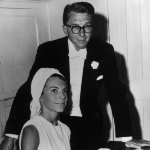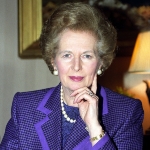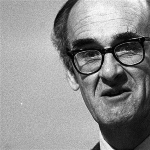Background
Robin Day was born on October 24, 1923, in London, England, the United Kingdom. He was the youngest of four children. His father was a Post Office telephone engineer who became a GPO administrative manager.


1965
Broadcasting House, Portland Pl, Marylebone, London W1A 1AA, UK
1st February 1965: Prime Minister Harold Wilson (1916 - 1995) at BBC Lime Grove TV studio being interviewed by (from left to right); Robert McKenzie, Robin Day (1923 - 2000) and Andrew Schofield. (Photo by Terry Disney)
1957
London, England, UK
1957 London, England, In the ITN television studios presenter Robin Day talks on the telephone while preparing to go on air to read the news (Photo by Popperfoto)
1959
Robin Day
1965
Broadcasting House, Portland Pl, Marylebone, London W1A 1AA, UK
1st February 1965: Prime Minister Harold Wilson (1916 - 1995) at BBC Lime Grove TV studio being interviewed by (from left to right); Robert McKenzie, Robin Day (1923 - 2000) and Andrew Schofield. (Photo by Terry Disney)
1972
1st November 1972: English journalist and broadcaster Sir Robin Day (1923 - 2000) with comedian Frankie Howerd, both in a cheerful mood during a Foyle's literary luncheon marking the 50th Anniversary of Broadcasting. (Photo by Central Press)
1975
28th November 1975: English journalist and broadcaster Sir Robin Day (1923 - 2000) delivering an after-dinner speech, with Edward Heath the former Prime Minister on his right. (Photo by Evening Standard)
Middleton Hall Ln, Brentwood CM15 8EE, UK
From 1934-1938, Day attended the Brentwood School.
Podsmead Rd, Gloucester GL2 5AE, UK
Day attended Crypt School, Gloucester, for a short period of time.
Walls Rd, Bembridge PO35 5RH, Uk
Day enrolled at Bembridge School, Isle of Wight.
Queen's Ln, Oxford OX1 4AR, UK
Day enrolled himself at St Edmund Hall, Oxford. Whilst at Oxford University he was elected president of the Oxford Union debating society, and also took part in a debating tour of the United States of America, run by the English-Speaking Union.






















Robin Day was born on October 24, 1923, in London, England, the United Kingdom. He was the youngest of four children. His father was a Post Office telephone engineer who became a GPO administrative manager.
From 1934-1938, Day attended the Brentwood School from which he was shifted to Crypt School, Gloucester, for a short period of time and ultimately enrolled at Bembridge School, Isle of Wight. He served in the British army from 1943-47 as a captain and was stationed in East Africa, during the Second World War. Once the war was over, he enrolled himself at St Edmund Hall, Oxford. Whilst at Oxford University he was elected president of the Oxford Union debating society, and also took part in a debating tour of the United States of America, run by the English-Speaking Union. He was called to the Bar at Middle Temple in 1952 but practiced Law only briefly.
Day spent one year with the British Information Services in the United States, was briefly employed, on a temporary basis, by BBC Radio and, in 1955, joined Independent Television News, at its launch, as one of its new breed of newscasters.
ITN made him. It gave him, by his own account, his happiest four years in television - though he was not an instant success. It was originally felt that he was too unsympathetic and harsh in manner, but this view changed as he developed an entirely new style of interviewing.
In the pre-Day era, television interviews were almost always respectful, generally dull and stiff, often insipid. Day asked the direct question pointed like a dagger at the jugular. The turning point in his career was an interview with Sir Kenneth Clark, then chairman of Independent Television, at a time when proposals were mooted to cut ITN's airtime and money. Day asked him questions about the station's future which dumbfounded colleagues and critics by their directness. It was unprecedented that the person in the ultimate charge should be questioned about his responsibilities by one of his own employees - and the impact was dramatic.
There followed a number of historic interviews which established Day's reputation: with Egypt's President Nasser after the 1956 Suez crisis, when Day sought to pin him down on whether he accepted the existence of the state of Israel; with ex-President Truman - "Mr President, do you regret having authorised the dropping of the atomic bomb?"; and, notably, with Prime Minister Harold Macmillan in 1958, in what the Daily Express called "the most vigorous cross-examination a prime minister has been subjected to in public".
This interview turned Macmillan into a television personality and was probably the first time that television became a serious part of the political process. Day also made parliament come alive with his unscripted reports of the heated debates during the Suez debacle.
In 1959, Day moved to the BBC and Panorama, then the most prestigious current affairs program. The corporation never really made the best use of his talents, except at elections and, eventually, on Question Time, between 1979 and 1989. The fashion turned against "talking heads" and "government by debate", with which he, above all others, was identified. He was gradually sidelined, as a chairman figure who simply opened and closed programs. He described his pre-Question Time period as "10 years in the wilderness". There was even a spell of nearly two years when he did not appear at all.
In the early-1970s, Day became more deeply involved in radio, where he proved an innovator with It's Your Line, from 1970 to 1976. This was a national phone-in program that enabled ordinary people, for the first time, to put questions directly to the prime minister and other politicians (it later spawned Election Call).
He also presented The World At One, from 1979 to 1987, but never felt that radio was his metier. He was not at his best reading from a script, and it is significant that, in his memoirs, he dismisses his eight-year contribution to the program with a single sentence.
General elections, however, were the time when all the grand inquisitor's talents as cross-examiner came on full display, when the television public saw "the scowling, frowning, glowering" Robin Day "with those cruel glasses" (Frankie Howerd's description), as well as the relieving shafts of humor.
His most satisfying role in television came with Question Time. At last, he was given his own show, with an audience - which he had long asked for - albeit late at night, as a temporary, six- month "filler" and mainly as a way of giving him something to do. Its success in becoming, under his chairmanship, the most popular and effective current affairs program on television reveals a great deal about his talents.
Day penned four books in his lifetime. His first book, published in 1963, was The Case for Televising Parliament, and his Day by Day: A Dose of My Own Hemlock followed in 1975. His last two works, memoirs entitled Grand Inquisitor and But with Respect, appeared in 1989 and 1993, respectively.
Sir Robin Day, who has died aged 76, was the most outstanding television journalist of his generation. He transformed the television interview, changed the relationship between politicians and television, and strove to assert balance and rationality into the medium's treatment of current affairs.
For his presenting skills, straightforward approach to political issues and the ability to make a politician answerable to public questioning and curiosity by probing them meticulously, Day was knighted in 1981.
His work won him many honors, including the Richard Dimbleby Award for factual television in 1974, and the Broadcasting Press Guild award for Question Time in 1980.
Day imbibed politics almost with his mother's milk. His father brought him up to revere parliament and great parliamentarians. As a nine-year-old, he was taken to hear Churchill speak, in the rain. Respect for parliament and the traditional institutions of British life, such as the monarchy and the legal profession, was at the heart of his philosophy all his life.
It might be said that his interests were somewhat conventional and narrow. He was almost fixated by parliament and seemed to think that if someone had made a great parliamentary speech, they had won a great battle, when, in fact, it was events outside parliament that were transforming British politics. His world was one of party politics and current events, rather than long-term trends. He was not particularly interested in industrial affairs or economics, or developments in European countries.
For 25 years he campaigned tirelessly, and eventually successfully, for the televising of parliament - not in the interests of television, but of parliament itself. He claimed that he was the first to present the detailed arguments in favor, in a Hansard Society paper in 1963.
He regretted that he had never entered parliament - although he ran as a Liberal at Hereford in 1959 - and contributed to the real world of politics, instead of playing a secondary role through television.
Day believed passionately in "government by debate" and in the need for television to balance pictures of current events with reasoned analysis. Otherwise, the powerful visual impact of television would distort and trivialize. He has equally dedicated to the principle that the interviewer had a duty to be well-informed.
Many observers commented on his careful preparation; few realized just how assiduous he was. He would read every current biography and autobiography, and nearly every government white paper. Without research assistants to supply him with background briefings, he would generally be better informed than the many cabinet ministers he interviewed.
Quotations:
"Television thrives on unreason, and unreason thrives on television. It strikes at the emotions rather than the intellect."
"I think it's really important to use your hands and get close to materials. To be up close to real things like rain and mud; to have contact with nature."
"I think and hope there are far more people aware of the need to look after our future."
Day was elected president of the Oxford Union debating society.
In his private life, Day had two personalities. To those who did not know him, he could, at times, appear aggressive and insensitive, seemingly interested only in those who were important because of their fame, public success or wealth. He sometimes found it difficult to talk naturally to intelligent women.
To those who knew him well, however, he was the most stimulating, amusing, convivial and warmest of companions. He was one of those rare people who was genuinely loved by his friends. He was prepared to take infinite pains on their behalf. He was also surprisingly modest; despite his obvious success in public life, he frequently talked of his career as a relative failure, because he had not achieved anything solid.
Day was known for wearing his trademark polka-dot bow tie, pin-striped suit, and oversize horn-rimmed glasses.
His grave reads, “In loving memory of Sir Robin Day the Grand Inquisitor”.
Physical Characteristics: In the 1980s, Day had a coronary bypass, and he suffered from breathing problems that were often evident when he was on the air. He had always fought against a tendency to put on weight. As an undergraduate, he weighed 17 st 0 lb (108 kg; 238 lb) and claimed that, in the course of his life, he had succeeded in losing more weight than any other person.
In 1965, Day married Katherine Ainslie and had two sons. The marriage was dissolved in 1986. One of the tragedies of his life was that his elder son never fully recovered from the effects of multiple skull fractures he sustained in a childhood fall..



Day had a controversial interview with the Defence Minister Sir John Nott after the Falklands War (1982). The minister walked out on live TV after being called a "here today, gone tomorrow politician" compared to career soldiers.
